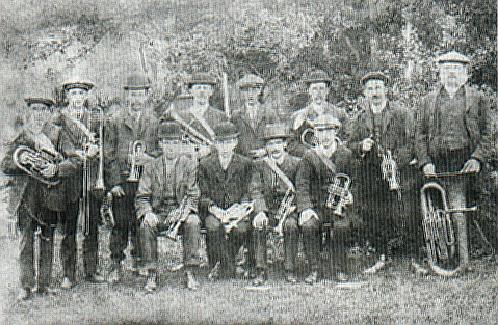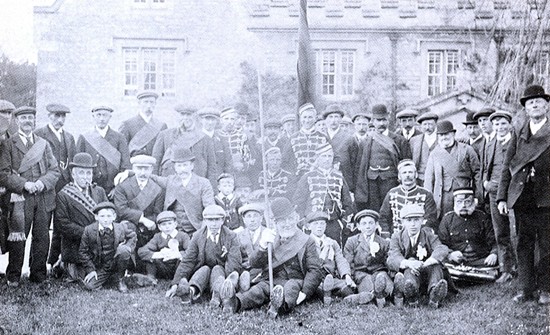Bourne Town Band
There has been a brass or silver band in the town on
several occasions over the past two hundred years but for some reason they never lasted and this may have been
because of the outbreak of the various wars during the 19th and 20th centuries when musicians were called up for military service. This would seem to be the explanation because bands have foundered during the Boer War
1899-1902, the Great War of 1914-18 and the Second World War of 1939-45 and there has been no
Bourne band in the town since then. It was re-formed as the Bourne Brass Band in 1857 and by the spring was already fulfilling public engagements. On Friday 5th June that year, the Stamford Mercury reported: The members of the Bourne Brass Band assembled in the Market Place on Wednesday evening last and played a selection of music. They now number about 20 and since they last appeared have procured a drum and bass bombardon [a form of brass tuba]. An improvement was easily detected in their performances. It being the Marquess of Exeter's court day, and a number of gentlemen dining at the Bull Hotel, further subscriptions amounting to upwards of £2 were collected and transferred to the leader in aid of the funds for purchasing instruments and music. One of the musicians who played trumpet with this band was Joseph Tye Flatters, shop assistant turned professional photographer with premises in North Street and who also became well known in the town as a bell ringer at the Abbey Church. He emigrated to Canada in 1871 with his wife and their three young children taking with him the engraved trumpet that he had played with the band, entertaining fellow passengers on the voyage to the New World. He settled in Canada where his descendants live today and the trumpet is one of their prized possessions which is handed down through the family and so Bourne will be remembered there for many years to come. A third band was formed in 1887 and after several months of practice, was sufficiently proficient to play carols in the market place on Christmas Eve. The prime mover was Mr Alfred Stubley, a local tradesman and a music lover with a reputation as a choral conductor at local concerts as well as being choirmaster at the Baptist Chapel in West Street. He began appealing for support with a notice in the local newspaper on 22nd July, having discovered that there were several able musicians living in the area who might be recruited. "The movement", forecast the newspaper, "is popular and has every prospect of success." By September, 22 men, all possessing their own brass instruments, had agreed to join and had started preparing for their first concert under Mr Stubley who became the first conductor, usually holding practice sessions in the kitchen of his home in West Street. The instruments included cornets, trombones, tenor and baritone saxhorns, euphoniums, bombardon, base and side drums, and the band played at several functions during the following weeks but the Christmas Eve carol concert was their first major public success. The success of the band was assured the following year when they were appearing at a variety of functions, after cricket matches and during church fetes, and giving promenade concerts at the Abbey Lawn, a musical entertainment then popular in Britain and which soon became a regular feature in the social life of the town. Although the band appeared at most civic functions free of charge, they were paid a fee for many other private engagements and during 1889, for instance, £50 was raised in this way. Richard Newton Pattison was later appointed bandmaster, thus beginning a family association with brass band music in Bourne that was to last well into the next century when his son, also Richard Newton Pattison, became bandmaster, and his son, yet another Richard Newton Pattison, joined the band as one of the instrumentalists. In 1896, the entire band enrolled in H
Company, the 2nd Volunteer Battalion, the Lincolnshire Regiment, which was
based in Bourne, and thenceforth became known as the Volunteer Company
Band and their conductor, Mr F J Clarke, was appointed bandmaster. The meeting was told that between £80 and £90 would be needed to equip the band and it was resolved that the money would be raised by subscriptions or donations and that the entire town be canvassed and an account for this purpose was opened at Lloyds Bank in the Market Place.
The money was raised and instruments purchased, although many band members already had their own. Smart uniforms were also issued, made in forest green material with silver braid, and the following year Bourne Town Band was giving its first concerts and was subsequently in great demand at social functions and parades. Apart from the concerts held by the band, a typical social occasion at which they appeared was at a garden fete at Cawthorpe House on Friday 27th June 1924, when local businessman Edward Pearce was presented with an easy chair in recognition of his 20 years of service as treasurer of the Bourne Institute.
The band, under the conductorship of Mr Pattison,
played popular selections throughout the event and they also provided the
music for the dancing with which the evening's programme concluded. The
band was a particular favourite of the vicar and he frequently made the vicarage lawn available for concerts during the summer months that were well attended over the next few years.
Christmas was also a popular time for carol concerts in the market place
and in the surrounding villages which always received a visit when
everyone gathered round and joined in with tremendous enthusiasm.
REVISED MAY 2014 See also Richard Pattison Joseph Flatters Alfred Stubley Sunday School treat of 1912 Music in the park
Go to: Main Index Villages Index
|



